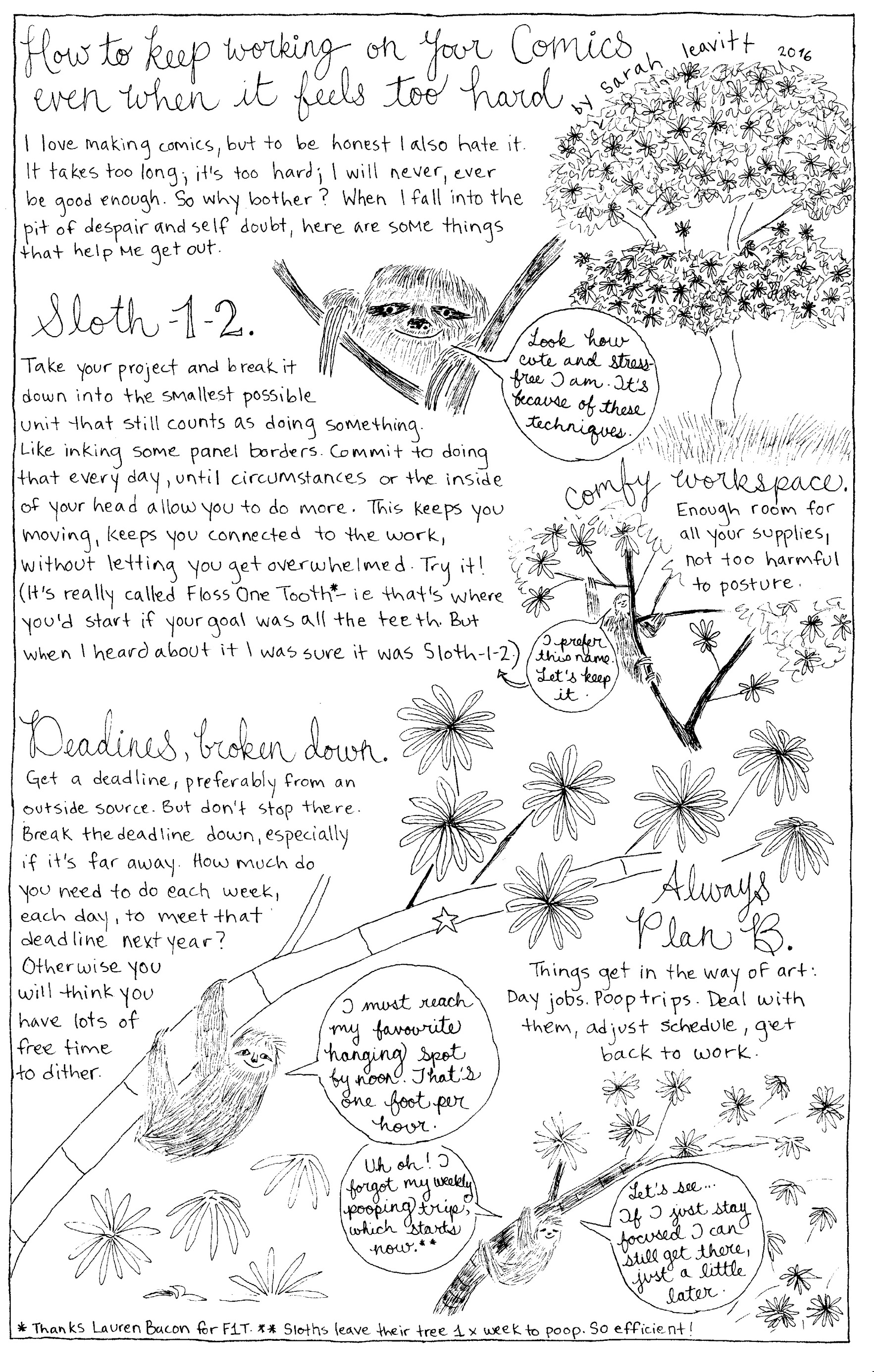I write and draw every day. I’ve been working on building a daily practice for about three years, and it’s been consistent for about a year now. This discipline has been hard-won after decades of procrastination and neglecting my craft. And I expect it to fluctuate as I continue: at some points I will need to do longer stretches each day, and at some points I will be able to do next to nothing. But I want to try to do at least a tiny bit each day as much as I possibly can for as long as I possibly can.
Artists step away from their creative practice for lots of reasons. For me, it’s been a whole range of things. One that I think a lot of you can relate to is a lifelong struggle with severe anxiety. In the past, when I didn’t have many tools or skills for managing this condition, it created long stretches of time in which I felt frozen, unable to do any creative work at all. Another barrier to creative work has been painful life events (like illness or death in the family), during which I haven’t had the energy or focus to do much besides cope with the situation. And then of course there’s work, and spending time with family and friends, and the daily list of mundane to-do’s that can crowd out any time for writing, drawing or other creative expression.
My second book, published in September, took me eight years to finish. This is partly because the research, writing, drawing and revisions took a long time. And partly because I spent many months and years of that time dealing with all the factors I’ve just listed.
I’ve come to believe that establishing a daily practice earlier in my life would have helped me immensely, both with my creative projects and with my mental health. Even a tiny bit of work every day is better than long stretches in which I’m totally separated from my writing and drawing. Some days this looks like hours of productivity. Other days it’s a few minutes late at night, when I want to go to sleep but am determined to get my daily work done.
Daily practice makes me feel that I am still connected to the artistic part of myself, even if the work I’m doing isn’t connected to the project I’m focused on right now, even if it’s something I end up recycling or hiding or tearing up in frustration. Daily practice builds my skills, keeps me thinking and exploring and experimenting. Daily practice lets me connect with a joyful, constructive energy even on days that completely suck in every other way.
So — here are some things you might try, gleaned from my own experience and others’, in order to keep your creative practice going even when times are tough and the world is conspiring against you.
Keep it small: Commit to doing something each day, and try committing to less than you think you can really do. So, for example, “I will write/draw for 3 minutes a day.”
Make yourself a workspace: Whether it’s a cozy chair or a fully-equipped ergonomic work station or a table at your favourite cafe, it helps to have a location where you can sit down and work for your three minutes without complication.
Use a timer: I think this helps give a sense of how much you can get done in a short chunk of time — three minutes can be surprisingly long — and it also helps set a boundary around your work time.
Get a buddy or two: Maybe you sit down and work together. Or maybe you just check in with each other at regular intervals. I have used a shared blog and shared Google docs for this purpose. You can set your goals and report to your buddy(ies) about your progress. They can cheer you on and remind you of your deadlines.
Build up your daily practice to a longer period over time if you like, or maybe just promise yourself three minutes a day minimum, knowing that some days you will do way more. But the three minutes remains non-negotiable.
If you miss a day, just start over the next day. Don’t waste time beating yourself up.
If you want more ideas about maintaining your creative practice, I highly recommend Jessica Abel’s work. She has a book (Growing Gills) and blog posts and exercises and questionnaires you can fill out (we love those, right?). She also regularly runs a course called Creative Focus. I took it a few years ago and it was very helpful. She is also a fantastic cartoonist and comics teacher.
When I came and spoke with the TAs on November 4, we did an exercise that is influenced by the work I did with Jessica Abel as well as a book called Taming Your Gremlin by Rick Carson, a classic self-help book that’s been in print since 1984.
Here’s the exercise: Get two index cards, or two smallish pieces of paper and a pen. Don’t use a pencil; you shouldn’t spend any time erasing. Think about all the negative messages you have in your head about your creative work (you can’t do it, you’re not good, etc.). Set a timer for three minutes, and on one index card draw the jerk who’s saying these things. Maybe it’s a person, maybe it’s a monster, maybe it’s a blob. But give it form and personality. Add a speech balloon if you feel so moved. Don’t stop drawing until the timer stops. Now, think about a character who would talk back to that first monster, stick up for you and your work. If that’s hard to do, pretend you’re doing it on behalf of someone you love, not yourself. Then set the timer for three minutes again and draw that character and give it some words.
I drew my jerk monster years ago and kept it on my desk for a long time. I felt like I could let go of some of my own self-criticism when I knew that guy was taking care of it. You can see him in this article by Jessica Abel, wherein she also discusses the amazing work of Lucy Bellwood, who drew her demons for 100 days.
I hope that some of this helps. Please know that I feel like a total beginner at this, and am always worried that I won’t be able to maintain it. But I do it anyway! Whereas in the past I wouldn’t have bothered starting, knowing that I was destined for failure. Know what I’m saying?
Here’s a comic I made some years ago that captures some of these ideas. It’s about comics, but I think you could apply it to anything!



So lovely. Thank you.
What a great idea, to draw your monster 🙂 Very helpful and insightful.